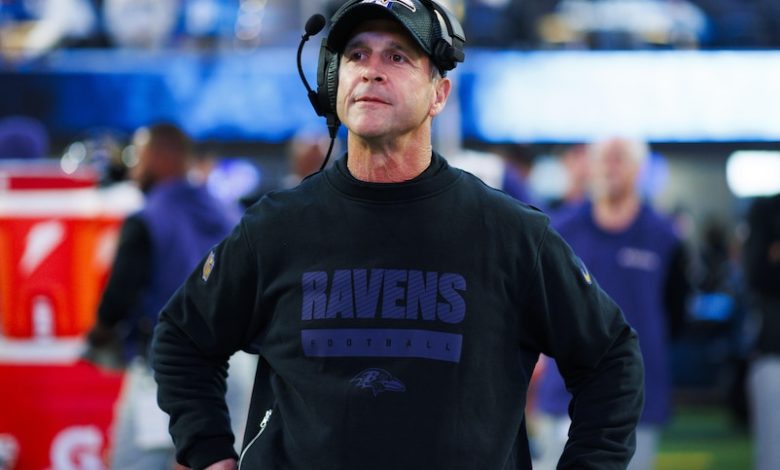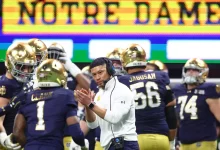Baltimore Ravens’ John Harbaugh ranks among the NFL’s top coaches, known for his leadership, adaptability, and consistent success.

John Harbaugh, the head coach of the Baltimore Ravens, stands as one of the NFL’s most respected and accomplished coaches. His journey to the top of professional football coaching is marked by a deep understanding of the game, a consistent track record of success, and an unwavering commitment to his players and the organization. Harbaugh’s leadership, adaptability, and ability to get the best out of his players have established him as one of the league’s most elite and enduring figures. As of 2025, his reputation is one of sustained excellence, and he has cemented his place among the NFL’s coaching elite.
Early Life and Career Beginnings
John Harbaugh’s journey to becoming an NFL head coach began long before he ever took the helm of the Ravens. Born in 1962 in Toledo, Ohio, Harbaugh grew up in a sports-centric family. His father, Jack Harbaugh, was a college football coach, and his brother, Jim Harbaugh, would go on to become an NFL quarterback and a highly successful head coach himself. John was immersed in football from a young age, and his deep understanding of the game and natural aptitude for coaching were evident early on.
Harbaugh attended Miami University in Ohio, where he played college football as a defensive back. Although he was not a star player, his passion for the game and knowledge of football strategy shone through. After his college career, Harbaugh’s coaching path began when he started working as an assistant coach at various levels. His coaching journey included stints in the NFL, NCAA, and even in the high school ranks. Harbaugh’s time working under various mentors allowed him to develop a well-rounded perspective on coaching, setting the stage for his future success.
The Path to the NFL
Before becoming the Ravens’ head coach, Harbaugh spent over a decade in the NFL as an assistant coach, working his way through the ranks. He began as a special teams coach for the Philadelphia Eagles in 1998 under head coach Andy Reid. This proved to be a formative period in Harbaugh’s career, as he learned under one of the NFL’s best, Reid, who would have a profound influence on Harbaugh’s coaching philosophy.
During his time with the Eagles, Harbaugh quickly established himself as one of the best special teams coordinators in the league. Special teams coaching requires a blend of attention to detail, adaptability, and the ability to motivate players who may not see as much playing time as starters. Harbaugh thrived in this environment, earning recognition for his ability to create effective and opportunistic special teams units. His success with the Eagles’ special teams helped set the stage for his transition to a larger role in coaching.
In 2008, after ten years with the Eagles, Harbaugh’s career took a major step forward when he was hired as the head coach of the Baltimore Ravens. The Ravens, coming off a successful playoff run in 2006 but in need of a fresh direction after firing former head coach Brian Billick, saw in Harbaugh a young, energetic leader with a clear vision for the team.
The Ravens’ New Era Under John Harbaugh
When Harbaugh took over the Ravens in 2008, the team had a solid foundation, including a strong defense and some offensive talent. However, the team needed a change in leadership. Harbaugh’s arrival ushered in a new era of Ravens football. His commitment to hard work, discipline, and attention to detail quickly became apparent, and his leadership style immediately resonated with the players. Harbaugh’s emphasis on team unity and resilience, combined with his strategic coaching approach, made a significant impact.
The 2008 season was a statement year for Harbaugh, as he led the Ravens to an unexpected playoff appearance in his first year as head coach. The Ravens advanced to the AFC Championship Game, losing to the Pittsburgh Steelers by a narrow margin. Despite the loss, Harbaugh’s impact was felt immediately, and he gained the respect of players and analysts alike. That season solidified Harbaugh as a coach with the potential to lead the Ravens to long-term success.
In subsequent seasons, Harbaugh continued to build on the foundation he had established. Under his leadership, the Ravens became a perennial playoff team, consistently competing at a high level. Harbaugh’s focus on building a balanced team—one that could excel on offense, defense, and special teams—made the Ravens a formidable force in the NFL.
The 2012 Super Bowl Championship
Harbaugh’s defining moment as a head coach came during the 2012 NFL season, when he led the Ravens to a Super Bowl victory. The Ravens had a talented roster, but their success under Harbaugh that year demonstrated his ability to adjust and adapt, particularly during the postseason.
The 2012 playoffs were full of memorable moments for the Ravens, including an epic 38-35 win over the Denver Broncos in the AFC Divisional Round, known for Joe Flacco’s “Mile High Miracle” throw to Jacoby Jones. The Ravens’ playoff run culminated in a victory in Super Bowl XLVII, where they defeated the San Francisco 49ers 34-31. The win marked Harbaugh’s first Super Bowl title and solidified his place in NFL history.
That Super Bowl victory was a testament to Harbaugh’s leadership and his ability to manage a team through adversity. The Ravens’ defense, led by linebacker Ray Lewis, was key to the team’s success, but it was also Harbaugh’s ability to rally the team, make timely decisions, and maintain a calm demeanor that stood out. His leadership in moments of pressure was instrumental in guiding the Ravens to the pinnacle of the NFL.
Consistency and Adaptability
One of Harbaugh’s greatest strengths as a coach is his ability to adapt to changes in the league and his roster. Over the years, Harbaugh’s coaching philosophy has evolved, but his core principles of hard work, discipline, and team-first mentality have remained constant. His willingness to adapt to the changing nature of the NFL, particularly with respect to offensive strategies and player utilization, has helped him stay at the top of his game.
For example, as the NFL began to see the rise of dual-threat quarterbacks, Harbaugh adapted the Ravens’ offense to take advantage of Lamar Jackson’s unique skill set. When Jackson took over as the starting quarterback in 2018, Harbaugh shifted the team’s offense to become more run-heavy, leveraging Jackson’s mobility and playmaking ability. This decision was bold but necessary, and it paid off, as Jackson led the Ravens to one of the league’s best records in 2019, earning the NFL MVP award.
Harbaugh’s ability to adapt to the strengths of his players, as opposed to trying to force them into a specific system, has been one of the key reasons for his sustained success. He understands the importance of evolving with the times, both in terms of offensive schemes and defensive strategies.
Leadership and Player Development
Harbaugh’s leadership style is one of the key factors behind his success. He is known for his ability to connect with his players, creating an atmosphere of trust and mutual respect. Harbaugh understands that coaching is not just about X’s and O’s—it’s about developing relationships with players and fostering an environment where they can thrive.
He is also known for holding his players accountable while encouraging them to be their best both on and off the field. Harbaugh fosters an environment where players are pushed to their limits but are also given the support they need to succeed. His ability to communicate effectively with players, his staff, and the media has helped him maintain a positive and cohesive culture within the Ravens organization.
Furthermore, Harbaugh has consistently developed players into stars. He played a significant role in the development of key players like Joe Flacco, Ray Rice, and, more recently, Lamar Jackson. Harbaugh’s ability to bring out the best in his players, especially at the quarterback position, has been a hallmark of his coaching career.
Legacy and Impact on the NFL
As of 2025, John Harbaugh’s legacy is firmly established as one of the NFL’s top coaches. His career achievements, including a Super Bowl victory, multiple playoff appearances, and a consistent track record of success, speak for themselves. Harbaugh’s impact on the Ravens is immeasurable—he has turned the team into one of the most consistent franchises in the NFL.
Additionally, Harbaugh’s influence extends beyond the Ravens organization. He has become a respected figure in the NFL coaching community, known for his insights into the game and his innovative approaches to coaching. His success has also paved the way for other coaches who are looking to blend traditional football values with modern, adaptive strategies.
Harbaugh has also been instrumental in maintaining the Ravens’ identity as a tough, physical football team while embracing modern offensive innovations. His adaptability to the evolution of the NFL, particularly in the quarterback position, has set him apart from many other coaches who struggle to adjust to changing trends in the league.









